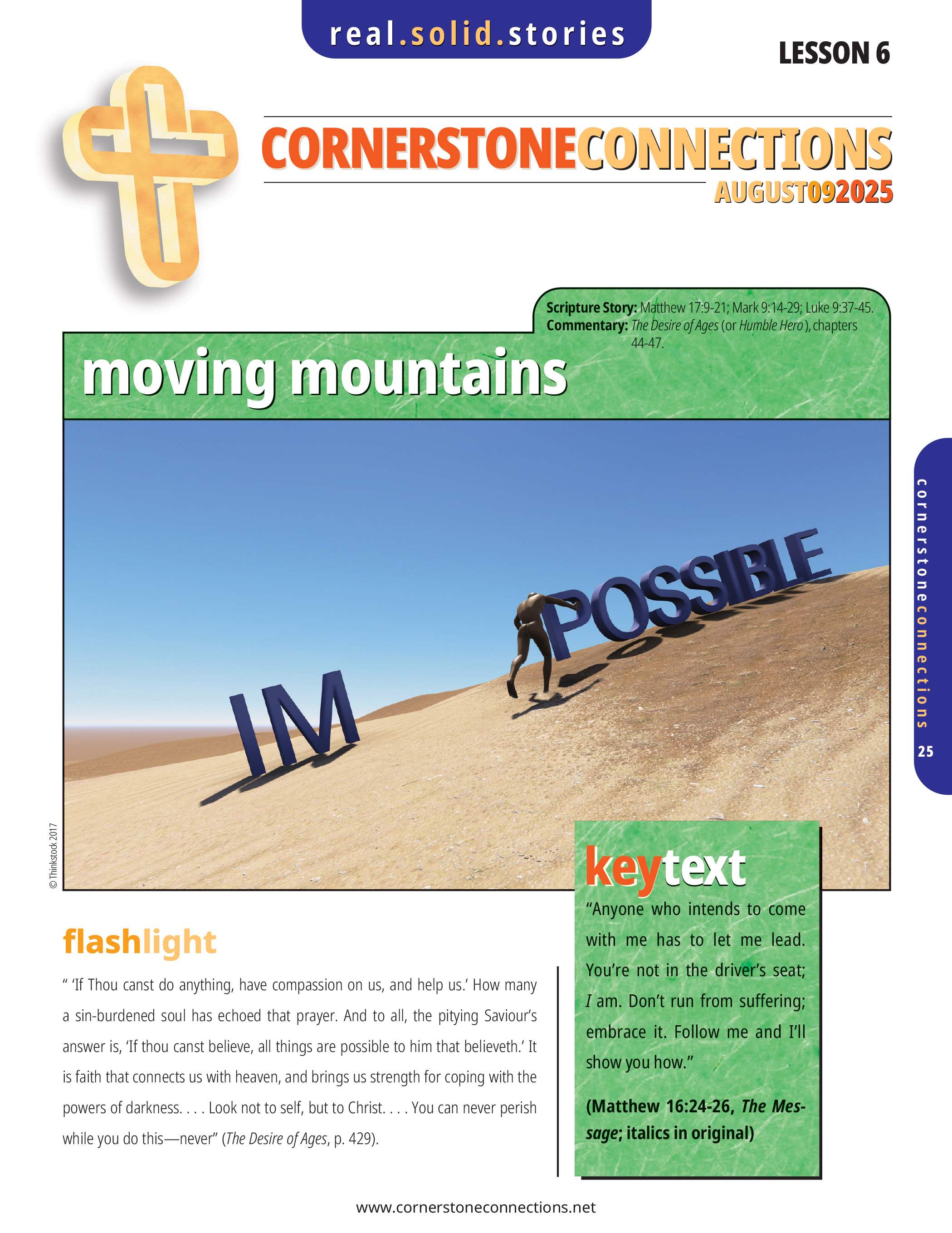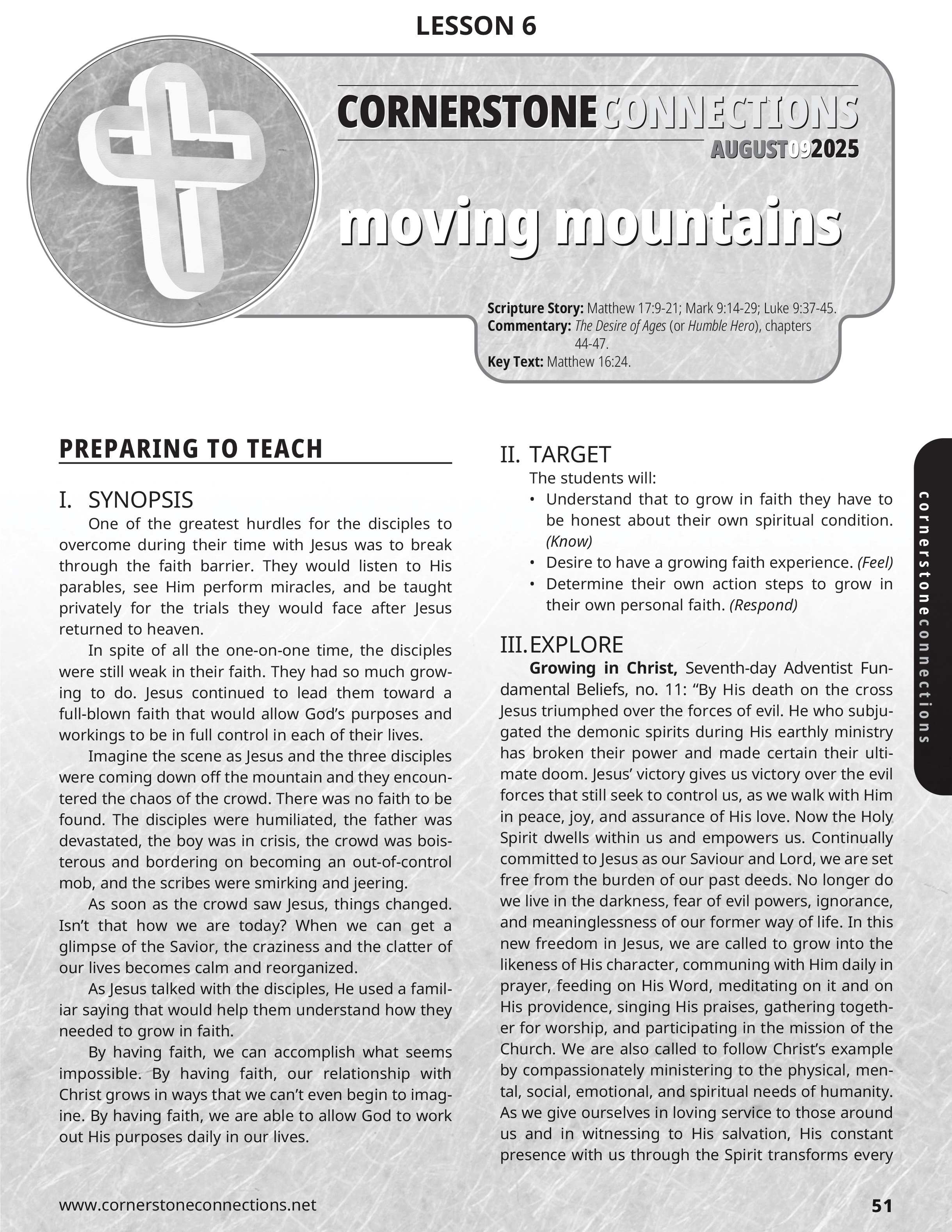Moving Mountains
Click below to download the Cornerstone Connections leader’s guide and student lesson. This week’s resources also include two lesson plans and a discussion starter video which offer different ways of looking at the topic. Each lesson plan includes opening activities, scripture passages, discussion questions, and real-life applications.
In spite of having face-to-face time with Jesus, the disciples still struggled with faith. But when they caught a glimpse of Jesus, the craziness of their lives became calm, and they were able to accomplish what seemed impossible.
Humble Hero (Desire of Ages)
Chapter 44 - The True Sign

Humble Hero (Desire of Ages)
Chapter 45 - The Foreshadowing of the Cross

Humble Hero (Desire of Ages)
Chapter 46 - Jesus Transfigured

Humble Hero (Desire of Ages)
Chapter 47 - A Battle With Satan's Spirits

Have you ever had a really difficult task that seemed impossible to accomplish? Was it climbing a mountain, swimming across a lake, or eating a six-scoop ice cream sundae? Jesus gave His disciples the task of healing the sick, preaching the good news of the kingdom, and casting out demons, but they were unable to accomplish all of these tasks. Were Jesus’ expectations unreasonable? In today’s lesson, we will explore what happened and see how Jesus handles an awkward situation.
Supplies: Pieces of rope or string for each person, approximately 36 inches in length
Instructions
1. Each participant should choose two partners.
2. Have each student tie a rope around one of their wrists.
3. One of the three students should tie their rope around their other wrist to form a circle.
4. The two other students should run their rope through the circle formed by their partner and then tie the rope around their other wrist to form three interlocking circles.
5. Without cutting or untying the string, separate the three circles so each person has their own circle.
(See illustration with two persons.)

Jesus asked His disciples to do things that seemed impossible. Why would He do that? What lesson was He attempting to teach them? The obvious answer isn’t always the solution to the problem. Let’s see what today’s Bible texts are attempting to tell us.
Read Matthew 17:9-13.
9 As they were coming down the mountain, Jesus instructed them, “Don’t tell anyone what you have seen, until the Son of Man has been raised from the dead.”
10 The disciples asked him, “Why then do the teachers of the law say that Elijah must come first?”
11 Jesus replied, “To be sure, Elijah comes and will restore all things. 12 But I tell you, Elijah has already come, and they did not recognize him, but have done to him everything they wished. In the same way the Son of Man is going to suffer at their hands.” 13 Then the disciples understood that he was talking to them about John the Baptist.
Read Malachi 3:1.
9 As they were coming down the mountain, Jesus instructed them, “Don’t tell anyone what you have seen, until the Son of Man has been raised from the dead.”
10 The disciples asked him, “Why then do the teachers of the law say that Elijah must come first?”
11 Jesus replied, “To be sure, Elijah comes and will restore all things. 12 But I tell you, Elijah has already come, and they did not recognize him, but have done to him everything they wished. In the same way the Son of Man is going to suffer at their hands.” 13 Then the disciples understood that he was talking to them about John the Baptist.
Read Matthew 17:14-21.
14 When they came to the crowd, a man approached Jesus and knelt before him. 15 “Lord, have mercy on my son,” he said. “He has seizures and is suffering greatly. He often falls into the fire or into the water. 16 I brought him to your disciples, but they could not heal him.”
17 “You unbelieving and perverse generation,” Jesus replied, “how long shall I stay with you? How long shall I put up with you? Bring the boy here to me.” 18 Jesus rebuked the demon, and it came out of the boy, and he was healed at that moment.
19 Then the disciples came to Jesus in private and asked, “Why couldn’t we drive it out?”
20 He replied, “Because you have so little faith. Truly I tell you, if you have faith as small as a mustard seed, you can say to this mountain, ‘Move from here to there,’ and it will move. Nothing will be impossible for you.”
In the context of the plan of salvation, Jesus did everything He could to prepare the world for His coming. Writings, visions, and messengers were a few of the ways that Jesus proclaimed His first coming to the world, but somehow the world missed or misunderstood the message. Jesus then came to the earth to reveal the Father by living among us. While He was here, He gathered disciples around Him to teach them the ways of His kingdom, but they didn’t always understand His ways or teaching. Today’s lesson illustrates the necessity of regularly studying God’s word and spending time talking with and listening to God. Jesus equips His disciples with the ability to complete the tasks He gives us, but sometimes our overconfidence rears its ugly head and derails God’s plan. God’s goal for our life is for us to rely on Him for our strength and abilities and allow Him to work through us.

LEADER’S NOTE
For a Relational Bible Study (RBS) you’ll want to get into the Scripture passage and encourage the youth to imagine participating in the story while it’s happening. Then you will be able to better apply it to your own situation today.
You will need to ask God for the Holy Spirit to be present as your small group discusses the questions (no more than 3-6 people in a group is recommended). Start with the opening question. It is a personal question and the answer is unique for each individual. There is no right answer and nobody is an expert here, so don’t be surprised when you hear different responses. You are depending on the Holy Spirit to be present and to speak through your group. Say what God prompts you to say, and listen to what others share.
Take turns reading the chapter out loud. Follow that with giving the students some time to individually mark their responses to the questions (a PDF version of the handout is available as a download). This gives each person a starting point for responding when you start to share as a group. Next, begin the discussion by asking the students to share what they marked and why on each question as you work your way through. Feel free to take more time on some questions than others as discussion warrants.
Encourage each person in the group to apply what is discussed to their personal lives and to share with the group what they believe God wants them to do. Then ask them to pray that God will help each of them to follow through in doing so. Remind them to expect that God will show them ways to live out the message of this passage in the coming week, and that they are free to ask others in the group to help hold them accountable.
Be sure everyone takes time for personal applications before you end your Sabbath School time together.
The story in this week’s lesson might not rate as high in the “wow” factor as the feeding of the 5,000 or Jesus walking on water, but it still has remarkable supernatural elements to it. It includes both failure and success—which means the disciples tried something and failed, then Jesus did it with success. It’s the story of the father whose son had an evil spirit the disciples couldn’t cast out, but when Jesus showed up, the demon had to leave.
But there’s a back-story to this story. Remember that the disciples had cast out demons earlier when Jesus sent them out two-by-two (see Mark 6:7, 13). They had experience doing these supernatural things. But in Mark 9 they couldn’t seem to make it happen. The father became more desperate and lost some of his faith that Jesus and His disciples could do for him what they had done for others. And the religious leaders entered and started arguing—you can imagine how they would pounce on this sign of weakness.
There’s more to the back-story. Jesus wasn’t with the disciples, and neither were the three disciples from Christ’s inner circle—Peter, James, and John. Mark 9:1-13 describes Christ’s transfiguration on the mountain in front of these three privileged disciples. Besides their being blown away seeing Jesus, hearing the Father speak, and observing Moses and Elijah interacting with Jesus, Christ told them on the way down the mountain to keep this a secret until He rose from the dead. Right! What? Rise from the dead? Who’s dying? You’re God. But you want us to keep quiet about this? The God part or the dying part we don’t understand, or the fact we just saw Moses and Elijah?!
In the afterglow of this powerfully supernatural experience for Peter, James, and John, Jesus led them down the mountain to a scene in which the powers of evil seemed to rule over everything else, including the nine remaining disciples who weren’t on the Mount of Transfiguration and who could easily have been jealous because they got left out of the inner circle. They weren’t able to cast out one demon, yet they had previously cast out many.
One a scale of 1 (low) to 100 (high), where is your faith in Jesus right now?
Read Mark 9:14-29.
14 When they came to the other disciples, they saw a large crowd around them and the teachers of the law arguing with them. 15 As soon as all the people saw Jesus, they were overwhelmed with wonder and ran to greet him.
16 “What are you arguing with them about?” he asked.
17 A man in the crowd answered, “Teacher, I brought you my son, who is possessed by a spirit that has robbed him of speech. 18 Whenever it seizes him, it throws him to the ground. He foams at the mouth, gnashes his teeth and becomes rigid. I asked your disciples to drive out the spirit, but they could not.”
19 “You unbelieving generation,” Jesus replied, “how long shall I stay with you? How long shall I put up with you? Bring the boy to me.”
20 So they brought him. When the spirit saw Jesus, it immediately threw the boy into a convulsion. He fell to the ground and rolled around, foaming at the mouth.
21 Jesus asked the boy’s father, “How long has he been like this?”
“From childhood,” he answered. 22 “It has often thrown him into fire or water to kill him. But if you can do anything, take pity on us and help us.”
23 “ ‘If you can’?” said Jesus. “Everything is possible for one who believes.”
24 Immediately the boy’s father exclaimed, “I do believe; help me overcome my unbelief!”
25 When Jesus saw that a crowd was running to the scene, he rebuked the impure spirit. “You deaf and mute spirit,” he said, “I command you, come out of him and never enter him again.”
26 The spirit shrieked, convulsed him violently and came out. The boy looked so much like a corpse that many said, “He’s dead.” 27 But Jesus took him by the hand and lifted him to his feet, and he stood up.
28 After Jesus had gone indoors, his disciples asked him privately, “Why couldn’t we drive it out?”
29 He replied, “This kind can come out only by prayer.”
1. What did the nine disciples argue about with the religious leaders?
2. What happened when Jesus arrived?
3. Why couldn’t the disciples heal the demon-possessed boy?
4. Why did Jesus accuse the people of being faithless (vs. 19)?
5. What did the showdown between the evil spirit and Jesus demonstrate?
6. When are you likely to lack supernatural power to help others?
7. When do you find it easy to believe? When do you find it hard to believe?
8. How does your faith in Jesus and His power affect how you relate to others, especially those who need help?
The miracle on the mountain of transfiguration (faithful) and the lack of a miracle at the base of the mountain (faithless) illustrate two powers at work on this earth. Do you relate more to Peter, James, and John, or to the other nine disciples left behind and impotent as they continued discussing their favorite topic: What about me?
But Jesus came down from the mountain and healed the demon-possessed boy. In the process, the power of evil demonstrated itself, but certainly did not thwart Jesus from freeing the boy. But Jesus chastised those at the base of the mountain for lacking faith. Without being defensive, we have reason to ask ourselves, “Do we lack faith?” Another way to ask it is, “What supernatural things is God doing through me?” or even “Is my lack of connection to God (prayer, reflection on His word) squelching my faith in God?”
We can cluck our tongues at the disciples or be glad we aren’t them, but the fact remains that Jesus wants to help others on earth right now through the young people in your Sabbath School. Do they have the faith—trusting Jesus to do His thing through them at this time? Are they faithful or faithless? If in question, connect with God this week. See the application section for some ideas.
Here are a few application ideas for you to move from Sabbath School into action this coming week and beyond. Feel free to adapt this as the Holy Spirit moves you, but, by all means, apply this Scripture study to your life in the coming week and month.
Jesus told His disciples their inability to cast out the demon came from their lack of prayer. So spend time in prayer this week! This will prepare you to have faith in Christ for whatever He wants you to do, whether that’s casting out demons or anything else you might do on His behalf. You might already have your regular prayer practices.




